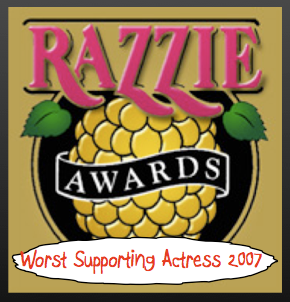 Oh, the things one does for love. See, not so very long ago, on "Nominations Eve," a bit of pre-nomination stircraziness hit lil StinkyLulu. Who would the Best Supporting Actresses of 2007 be? We were pretty sure about Swinton, Ronan, Ryan and Blanchett? But there was that mysterious 5th spot. Would it be Keener or Dee or Redgrave or...? Oh, the agony. But lo. Behold. Another organization seemed to have tuned right into StinkyLulu's desperate craving for a firm field of nominees. Right on time, The Razzies -- or, if you will, the anti-Oscars -- sneakily made their nominations at precisely the moment Awards-junkie Lulu was most craving a nomination fix. Even more, upon first sight of the roster of Razzie Nominees for Worst Supporting Actress, StinkyLulu lit upon a characteristically crackpot idea: wouldn't it be a hoot if I asked my lovely readers to select one Razzie-nominated performance to get the Supporting Actress treatment? And so it went, and so you voted, and so I went, and indeed 'twas a hoot. And a holler. Boy, did I holler. And, now, without further ado, StinkyLulu delivers the Supporting Actress treatment to the Razzie-nominated performance that received a whopping 42% of your vote...
Oh, the things one does for love. See, not so very long ago, on "Nominations Eve," a bit of pre-nomination stircraziness hit lil StinkyLulu. Who would the Best Supporting Actresses of 2007 be? We were pretty sure about Swinton, Ronan, Ryan and Blanchett? But there was that mysterious 5th spot. Would it be Keener or Dee or Redgrave or...? Oh, the agony. But lo. Behold. Another organization seemed to have tuned right into StinkyLulu's desperate craving for a firm field of nominees. Right on time, The Razzies -- or, if you will, the anti-Oscars -- sneakily made their nominations at precisely the moment Awards-junkie Lulu was most craving a nomination fix. Even more, upon first sight of the roster of Razzie Nominees for Worst Supporting Actress, StinkyLulu lit upon a characteristically crackpot idea: wouldn't it be a hoot if I asked my lovely readers to select one Razzie-nominated performance to get the Supporting Actress treatment? And so it went, and so you voted, and so I went, and indeed 'twas a hoot. And a holler. Boy, did I holler. And, now, without further ado, StinkyLulu delivers the Supporting Actress treatment to the Razzie-nominated performance that received a whopping 42% of your vote...approximately 10 minutes and 20 seconds
13 scenes
roughly 10% of film's total running time
Julia Ormond plays Susan Fleming, the terrified but loving mother of good girl Aubrey (Lindsay Lohan) who may or may not actually be bad girl Dakota (Lindsay Lohan).13 scenes
roughly 10% of film's total running time
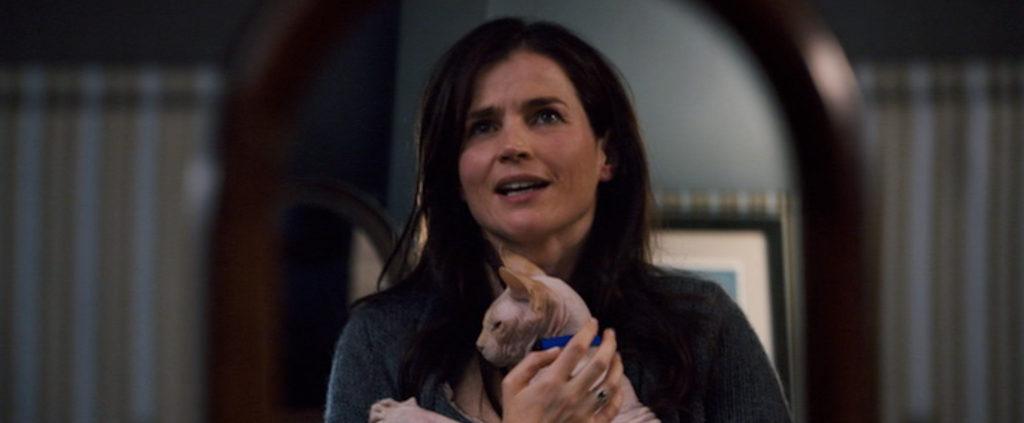 See, the not-so-simple conceit of I Know Who Killed Me is this: Aubrey (good Lindsay) has gone missing, causing great concern because the generic "idyllic little upper middle class hamlet" where Aubrey lives seems to have its very own serial sadist/murderer, predisposed to killing pretty young high schoolers and chopping off their fingers while bathed in electric blue light. An FBI-ish profiler team is even on the case of this serial killer with one known victim, under the assumption that beloved Aubrey has fallen prey to this awful digit-chopper/murderer. So, you can imagine everyone's surprise when Aubrey turns up, in a ditch on the side of the road, only partially dismembered, and basically, barely alive. And THEN imagine everyone's extra surprise when Aubrey wakes up but claims not to be Aubrey at all but some other girl -- some potty-mouthed, disrespectful badass named Dakota.
See, the not-so-simple conceit of I Know Who Killed Me is this: Aubrey (good Lindsay) has gone missing, causing great concern because the generic "idyllic little upper middle class hamlet" where Aubrey lives seems to have its very own serial sadist/murderer, predisposed to killing pretty young high schoolers and chopping off their fingers while bathed in electric blue light. An FBI-ish profiler team is even on the case of this serial killer with one known victim, under the assumption that beloved Aubrey has fallen prey to this awful digit-chopper/murderer. So, you can imagine everyone's surprise when Aubrey turns up, in a ditch on the side of the road, only partially dismembered, and basically, barely alive. And THEN imagine everyone's extra surprise when Aubrey wakes up but claims not to be Aubrey at all but some other girl -- some potty-mouthed, disrespectful badass named Dakota.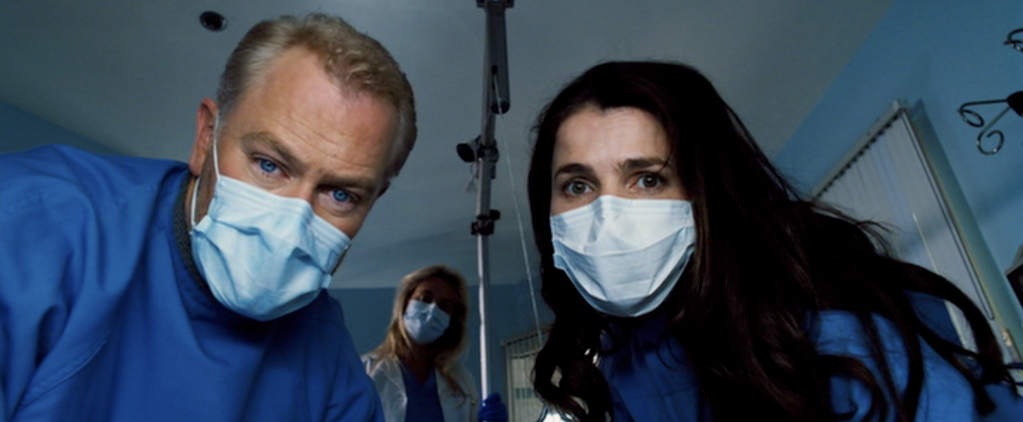 What follows is quite the mystery: Golly, Dakota and Aubrey sure look alike - how can this be? Does Aubrey have amnesia? Has the trauma split her personality? Had Aubrey been repressing that filthy mouth, general disrespect, and giddy whorishness all this time? Or is Aubrey just a craven fabulist? After all, didn't she write a story called "Dakota" in her creative writing class? And if she was making all of this up, either intentionally or as the result of psychic trauma, how'd she manage to get her foot and hand chopped off? Or (cue ominous music) is she telling the truth? Is she actually this Dakota person? Which, oh my, must mean that Aubrey is still out there? Somewhere...
What follows is quite the mystery: Golly, Dakota and Aubrey sure look alike - how can this be? Does Aubrey have amnesia? Has the trauma split her personality? Had Aubrey been repressing that filthy mouth, general disrespect, and giddy whorishness all this time? Or is Aubrey just a craven fabulist? After all, didn't she write a story called "Dakota" in her creative writing class? And if she was making all of this up, either intentionally or as the result of psychic trauma, how'd she manage to get her foot and hand chopped off? Or (cue ominous music) is she telling the truth? Is she actually this Dakota person? Which, oh my, must mean that Aubrey is still out there? Somewhere...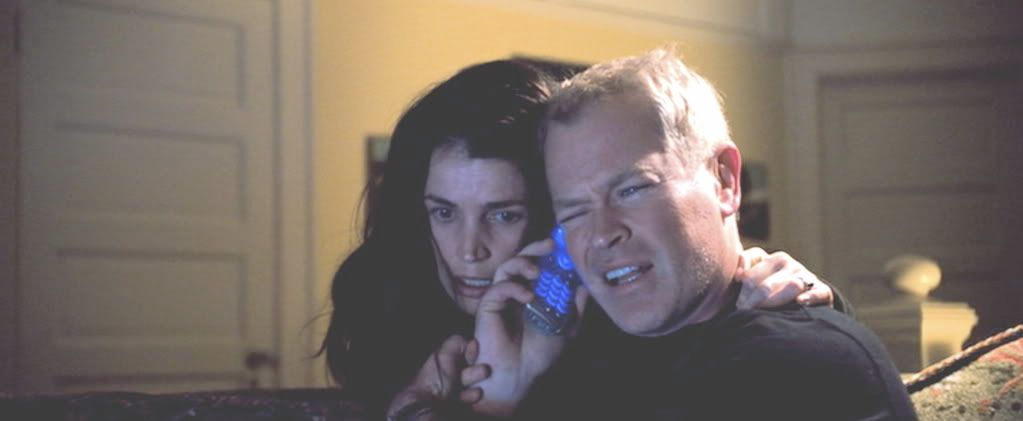 I know, right. Quite the noggin-scratcher... But what takes I Know Who Killed Me beyond just bad into the realm of Razzie-tastically bad is just how MUCH serious artiness director Chris Sivertson overlays atop the already overwrought mystery. To what might have been a simple story of stigmatic twins separated at birth (!), Sivertson overlays the following (click link for images): lotsa lotsa owls, some robotic hands, blue roses, stained glass caskets, a hairless Sphinx cat, the obsessive pursuit of piano trophies, a gardener who really likes his tree trunk, a strip joint run by a freaky skinny lady called Fat Teena, a hunky latino with a chest tattoo that flutters, and a whole lotta blue plexiglass. With Sivertson's auteurism, I Know Who Killed Me emerges as David Lynch done up for the Bratz-pack, an often stunning foray in the realm of the psychically superficial, certain to pervertedly traumatize fans of Lohan's star-making twin role in 1998's The Parent Trap and cause slumber parties around the world to meditate for minutes on the Aubrey/Dakota mystery.
I know, right. Quite the noggin-scratcher... But what takes I Know Who Killed Me beyond just bad into the realm of Razzie-tastically bad is just how MUCH serious artiness director Chris Sivertson overlays atop the already overwrought mystery. To what might have been a simple story of stigmatic twins separated at birth (!), Sivertson overlays the following (click link for images): lotsa lotsa owls, some robotic hands, blue roses, stained glass caskets, a hairless Sphinx cat, the obsessive pursuit of piano trophies, a gardener who really likes his tree trunk, a strip joint run by a freaky skinny lady called Fat Teena, a hunky latino with a chest tattoo that flutters, and a whole lotta blue plexiglass. With Sivertson's auteurism, I Know Who Killed Me emerges as David Lynch done up for the Bratz-pack, an often stunning foray in the realm of the psychically superficial, certain to pervertedly traumatize fans of Lohan's star-making twin role in 1998's The Parent Trap and cause slumber parties around the world to meditate for minutes on the Aubrey/Dakota mystery.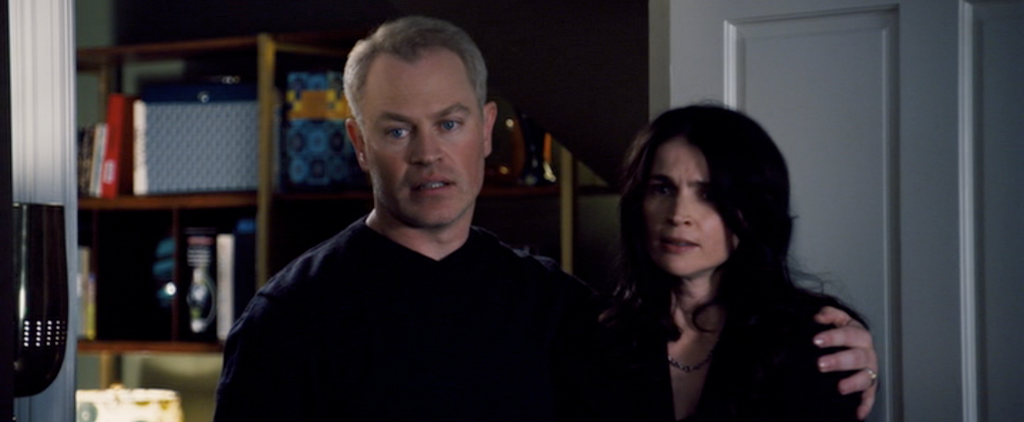 For her part (and unlike the savvier Neal McDonough who emerges comparatively unscathed), Julia Ormond makes the sensible, but ultimately ill-advised, choice to take the role of Susan seriously.
For her part (and unlike the savvier Neal McDonough who emerges comparatively unscathed), Julia Ormond makes the sensible, but ultimately ill-advised, choice to take the role of Susan seriously.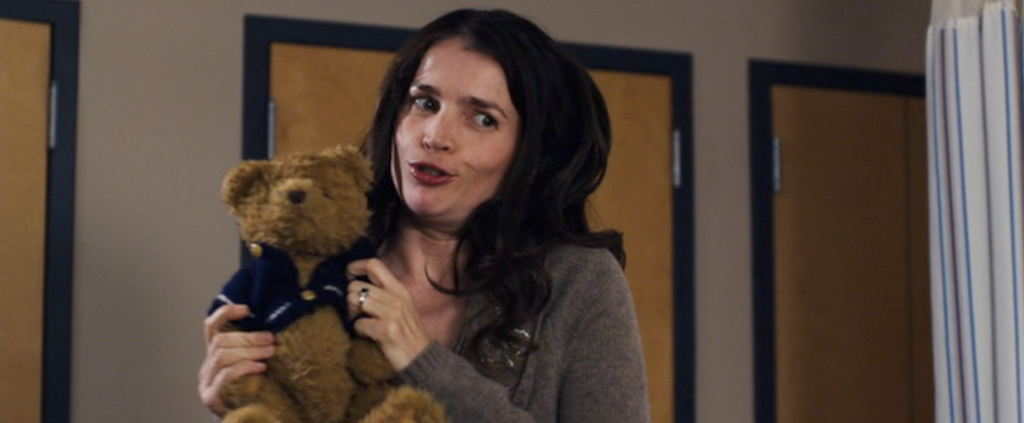 Ormond crafts Susan as a mother frustrated by the changes in her beloved daughter, desperate to bring her little girl back. Ormond's Susan first tries to coax Aubrey's memory/identity back into Dakota's consciousness by acting out a little scene with Aubrey's favorite childhood toy, the adorable Mr. Jervis.
Ormond crafts Susan as a mother frustrated by the changes in her beloved daughter, desperate to bring her little girl back. Ormond's Susan first tries to coax Aubrey's memory/identity back into Dakota's consciousness by acting out a little scene with Aubrey's favorite childhood toy, the adorable Mr. Jervis.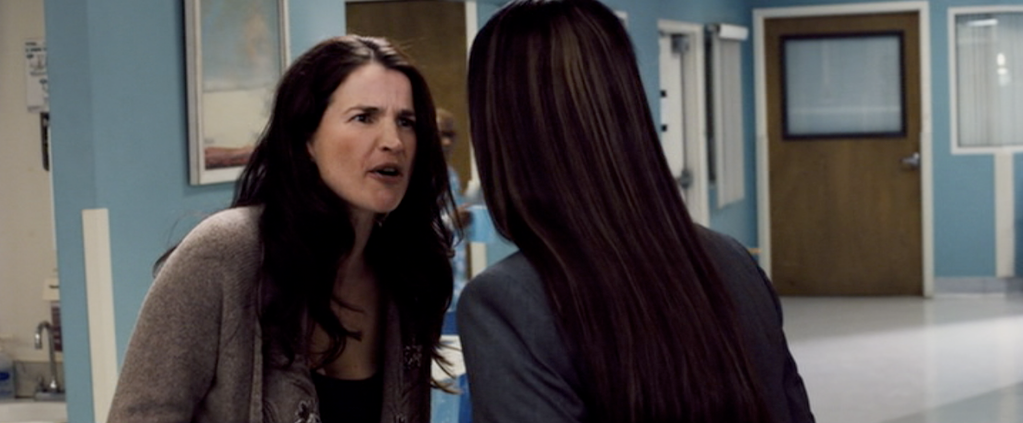 Then, Ormond's Susan goes all Aurora Greenway on the FBI agent (a disastrous Garcelle Beauvais).
Then, Ormond's Susan goes all Aurora Greenway on the FBI agent (a disastrous Garcelle Beauvais).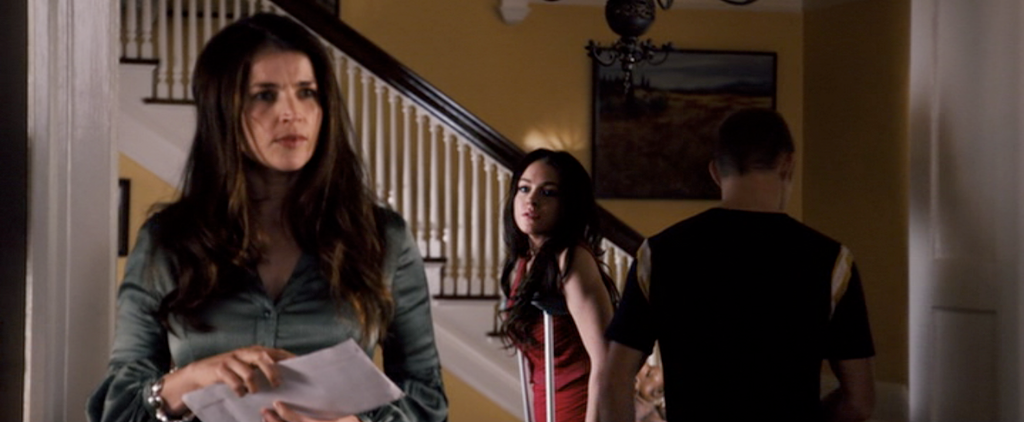 But that's nothing compared to Razzie-worthy rage Ormond's Susan conveys when Dakota (or is it Aubrey) seduces her virginal high school quarterback boyfriend just upstairs.
But that's nothing compared to Razzie-worthy rage Ormond's Susan conveys when Dakota (or is it Aubrey) seduces her virginal high school quarterback boyfriend just upstairs.Director Silverston intercuts the rowdy sex between Lohan and cutie Brian Geraghty with comparably intense scenes of Ormond scouring the kitchen sink, apparently furious at the residual grime on her pristine kitchen island. In this -- her character's big "Sponge Scene" -- Ormond blusters and fumes peevishly with an "out out damn spot" intensity that is, for all the worst reasons, absolutely memorable.
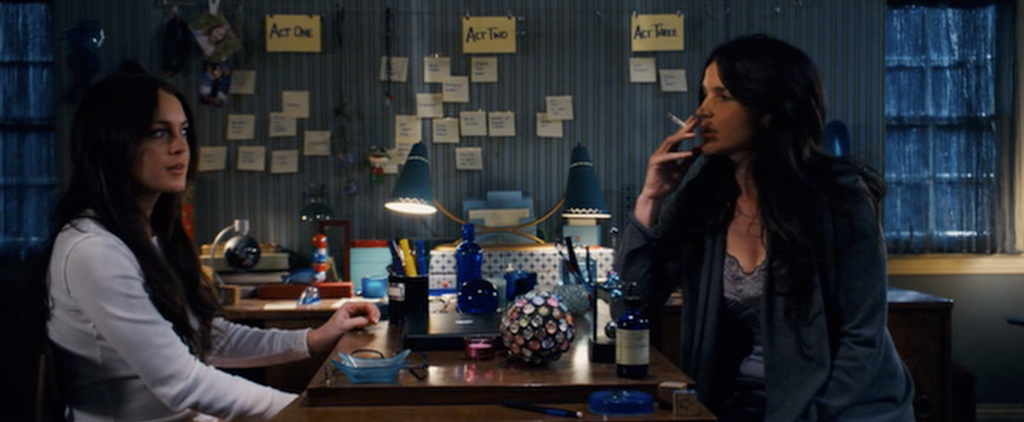 This is not to say that Ormond doesn't also "shine" in more understated moments, as when -- in the requisite 3rd act exposition/revelation sequence -- Ormond's Susan describes the circumstances of Aubrey's birth, which clues Dakota into a possible explanation of all the confusion (remember, stigmatic twins separated at birth).
This is not to say that Ormond doesn't also "shine" in more understated moments, as when -- in the requisite 3rd act exposition/revelation sequence -- Ormond's Susan describes the circumstances of Aubrey's birth, which clues Dakota into a possible explanation of all the confusion (remember, stigmatic twins separated at birth).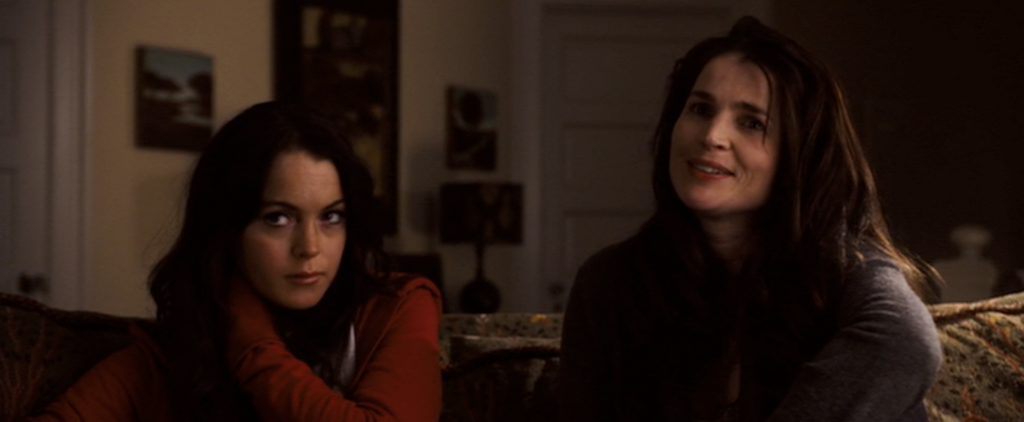 Again, Ormond plays the scene honestly, which proves again to be a mistake. Ormond's sensible delivery neither masks the howler-levels of implausibility of the dialogue, nor does it give much of a glimpse into a character who's lived at the center of a devastating deception for several decades. Ormond's lapse here is not that she's bad (though she is) but that she demonstrates no instinct for the style of great/bad horror acting. In playing the role sensibly, with no enigma or mystery or camp whatsoever, Ormond's Susan skews I Know Who Killed Me toward Our House instead of Grindhouse. The film might have been able to sustain the delirious awfulness of its convoluted conceit were it not for the wet blanket of melodramatic sincerity reliably provided by Ormond's Susan.
Again, Ormond plays the scene honestly, which proves again to be a mistake. Ormond's sensible delivery neither masks the howler-levels of implausibility of the dialogue, nor does it give much of a glimpse into a character who's lived at the center of a devastating deception for several decades. Ormond's lapse here is not that she's bad (though she is) but that she demonstrates no instinct for the style of great/bad horror acting. In playing the role sensibly, with no enigma or mystery or camp whatsoever, Ormond's Susan skews I Know Who Killed Me toward Our House instead of Grindhouse. The film might have been able to sustain the delirious awfulness of its convoluted conceit were it not for the wet blanket of melodramatic sincerity reliably provided by Ormond's Susan.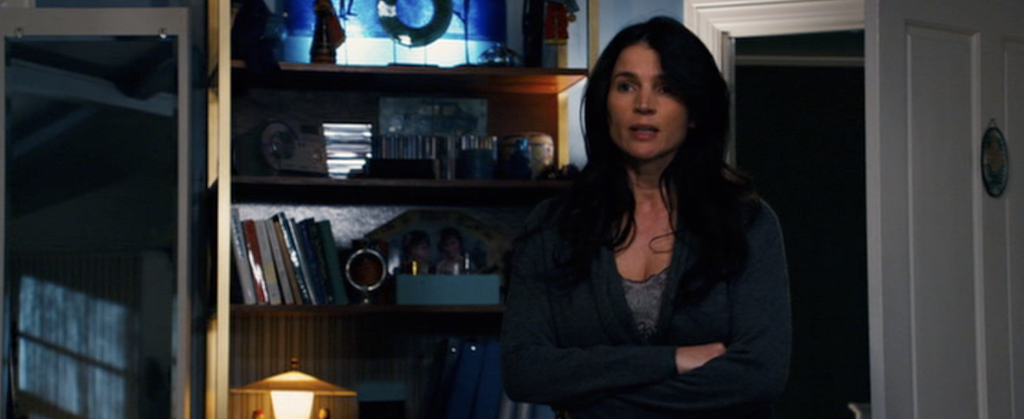 Or maybe not. Anyway, when I started preparations for this profile, I wondered whether Ormond's work in this year's big Razzie nominated film (a whopping 9 nominations total) might have made her a "coaster" nominee (my term for when a Supporting Actress nomination comes as part of a general swell of nominations for a particular film). Now, having carefully screened her work in the film, however, I can say confidently, "No. Ormond's Razzie nomination as Worst Supporting Actress is well-earned." Though many are responsible for I Know Who Killed Me failings -- Sivertson's auteur-lite overreach; the screenplay's incongruous puzzler; Lohan's self-conscious postures of bad girl rebellion (no film has more completely demonstrated the limits of Lohan's acting and charisma) -- through all that, though, I have to say that Julia Ormond's actressing at the edges is itself instrumental to the film's generalized badness.
Or maybe not. Anyway, when I started preparations for this profile, I wondered whether Ormond's work in this year's big Razzie nominated film (a whopping 9 nominations total) might have made her a "coaster" nominee (my term for when a Supporting Actress nomination comes as part of a general swell of nominations for a particular film). Now, having carefully screened her work in the film, however, I can say confidently, "No. Ormond's Razzie nomination as Worst Supporting Actress is well-earned." Though many are responsible for I Know Who Killed Me failings -- Sivertson's auteur-lite overreach; the screenplay's incongruous puzzler; Lohan's self-conscious postures of bad girl rebellion (no film has more completely demonstrated the limits of Lohan's acting and charisma) -- through all that, though, I have to say that Julia Ormond's actressing at the edges is itself instrumental to the film's generalized badness.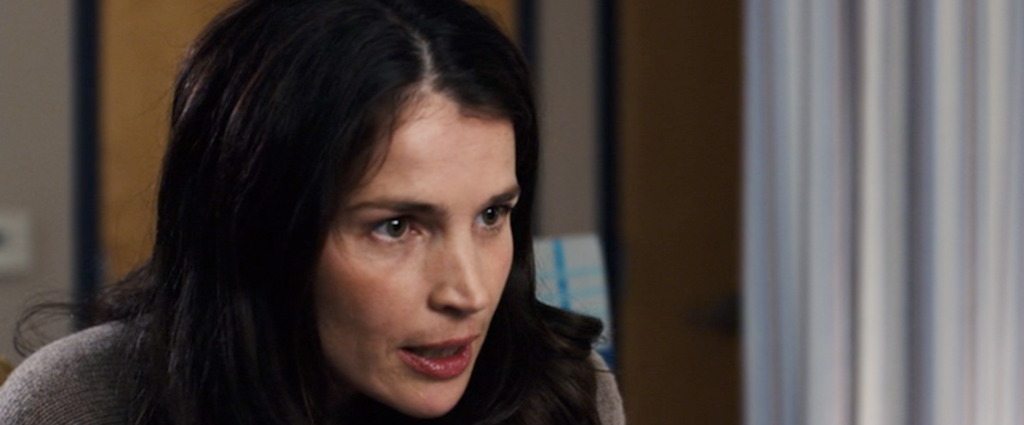 Indeed, Ormond's contributions to I Know Who Killed Me are essential in making it as profoundly and fully "accomplished" as it is. And that, lovely reader, is what actressing at the edges is all about...
Indeed, Ormond's contributions to I Know Who Killed Me are essential in making it as profoundly and fully "accomplished" as it is. And that, lovely reader, is what actressing at the edges is all about...

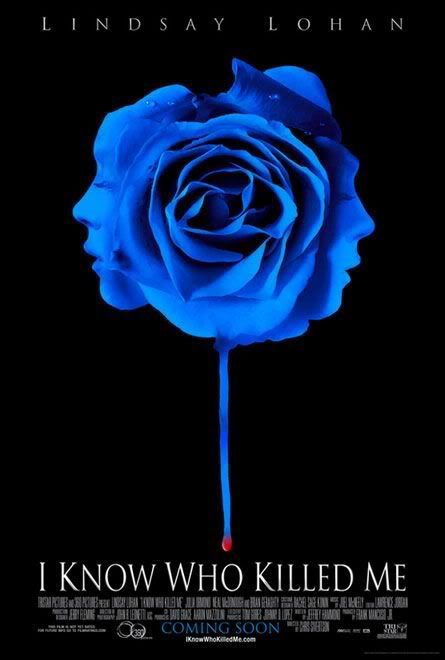
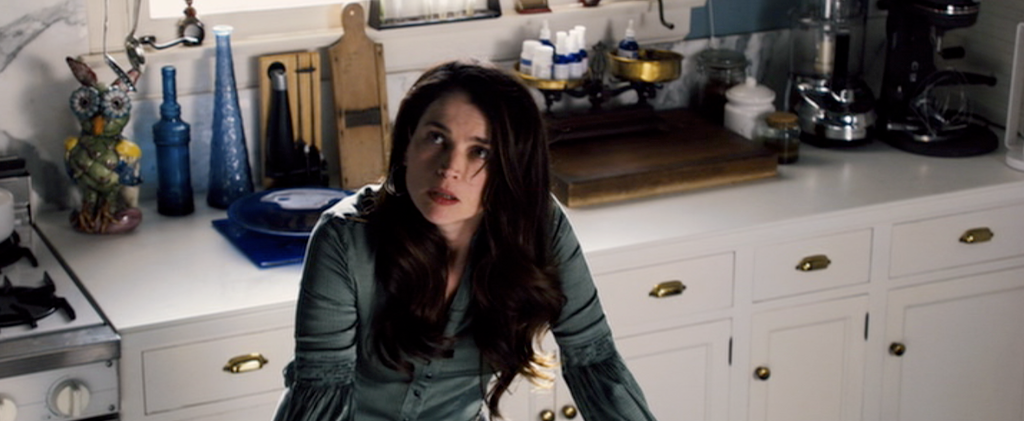
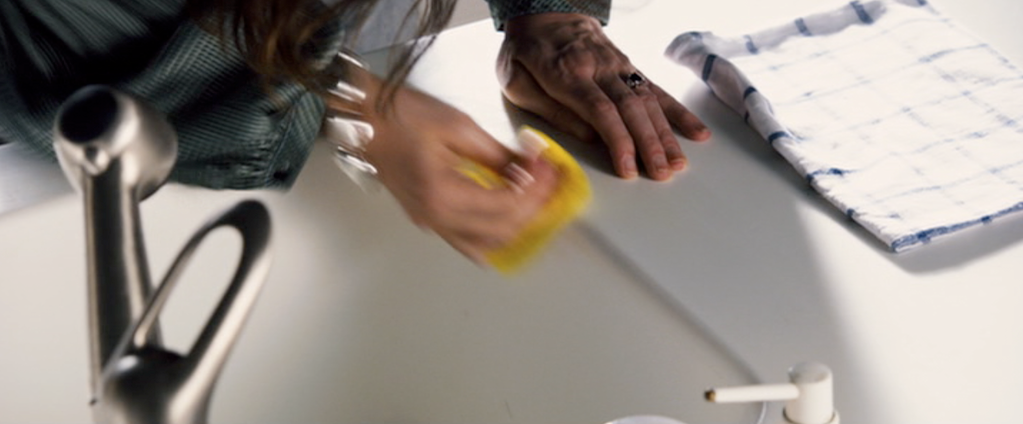
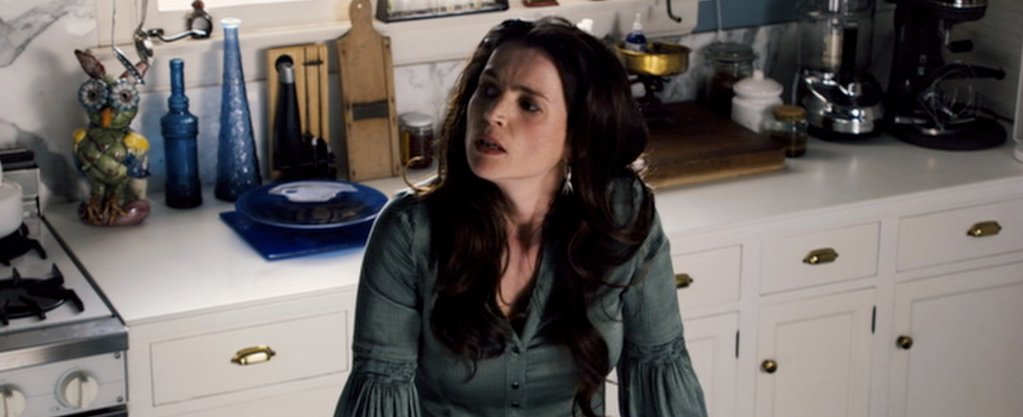
6 comments:
the things we do for love indeed. You rock! I know who thrilled me today.
you, lady, you
HAHAHA...glad you enjoyed it. I hear there's a great supporting possum in the movie
P.S. the visual verification is PMS . .
Why do I still want to see this movie? I have problems. Thanks for taking this bullet, Stinky.
Thank you so much!
I gotta be honest. I saw this movie, and I didn't think she was all that bad. I mean, the sponge scene is wrong on so many levels, but I think that was the director's fault. He chose to go slapstick in the middle of a thriller. And I thought she was actually kind of . . . ok in the scene where they watch the sonogram.
I just sat through this movie and I thought Julia Ormond was really strange here. To me, it was like she was acting in some other kind of movie. Nothing she does feels like it should belong in a thriller. Both the scene with the teddy bear and where she harasses the FBI agent were positively embarrassing. That being said, I don't think she was "bad" per se; just completely wrong.
Post a Comment